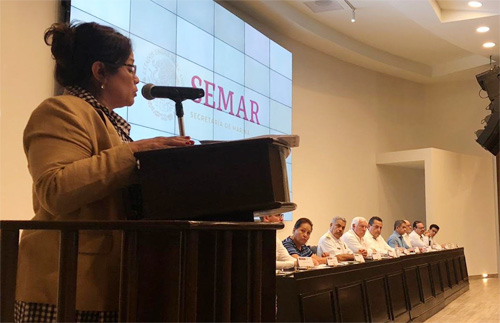For use of the media only;
not an official document.
PRESS RELEASE
CITES Secretary-General in Mexico to address the Vaquita and Totoaba crisis fueled by illegal international trade
The swim bladders ‘gold rush’ contravenes CITES regulations
 Geneva, 30 May 2019 – Today concludes the high-level mission of CITES Secretary-General Ivonne Higuero to Mexico in response to a request from the CITES Standing Committee and a subsequent invitation by the Mexican Government. The Secretary-General discussed with the Mexican Government and relevant stakeholders the critical status of the endemic vaquita porpoise with as few as 10-30 left in the world as a result of illegal trade in totoaba.
Geneva, 30 May 2019 – Today concludes the high-level mission of CITES Secretary-General Ivonne Higuero to Mexico in response to a request from the CITES Standing Committee and a subsequent invitation by the Mexican Government. The Secretary-General discussed with the Mexican Government and relevant stakeholders the critical status of the endemic vaquita porpoise with as few as 10-30 left in the world as a result of illegal trade in totoaba.
Notes to editors:
For more information, please contact Liu Yuan at yuan.liu@un.org.
About CITES
With 183 Parties, the Convention on International Trade in Endangered Species of Wild Fauna and Flora (CITES) remains one of the world's most powerful tools for wildlife conservation through the regulation of trade. Thousands of species are internationally traded and used by people in their daily lives for food, health care, housing, tourist souvenirs, cosmetics or fashion. CITES regulates international trade in over 35,000 species of plants and animals, including their products and derivatives, to ensure their survival in the wild with benefits for the livelihoods of local people and the global environment. The CITES permit system seeks to ensure that international trade in listed species is sustainable, legal and traceable. CITES was signed in Washington D.C. on 3 March 1973 and entered into force on 1 July 1975.
Learn more about CITES by visiting www.cites.org or connecting to:
www.twitter.com/CITES
www.facebook.com/CITES
www.youtube.com/c/CITES
www.flickr.com/CITES